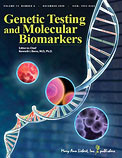Kotaska K, Kolarova J, Kotrcova K, Cepova J, Prusa R. Genet Test Mol Biomarkers. 2012 Mar;16(3):210–4. Epub 2011 Sep 15. IF: 0.879

Department of Clinical Biochemistry and Pathobiochemistry
Abstract
AIMS: The aim of the study was to investigate genetic variants predicting cardiovascular events in patients with dyslipidemia and compare its relationship with common risk factors including hyperlipidemia, metabolic syndrome, history of acute myocardial infarction, thrombosis, obesity, and smoking. MATERIALS AND METHODS: Five hundred two individuals divided into six groups corresponding with the risk factors and a control group of normolypidemic patients were analyzed for the presence of eight mutations and polymorphisms (endothelial nitric oxide synthase –786T → C and G894T; lymphotoxin A C804A; angiotensin-converting enzyme [ACE] ins/del; human platelet antigen 1 a/b; beta-fibrinogen –455G → A; apolipoprotein B [ApoB] R3500Q; APOE E2/E3/E4) using the ViennaLab CVD Strip assay. RESULTS: ACE deletions are the most frequent genetic variants in risk groups of dyslipidemic patients (from 58% in cardiovascular events to 51% in smokers). We found a strong relationship between genetic variants and risk factors. G894T is significantly associated with smoking (value of odds ratio [OR] = 1.62, p = 0.04), and ACE deletions are negatively associated with cardiovascular events (OR = 0.62, p = 0.03). CONCLUSION: Significant associations between genetic variants predicting cardiovascular events and common risk factors in dyslipidemic patients were found.
-mk-
